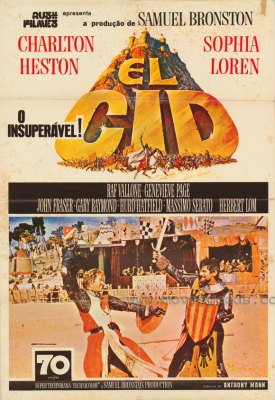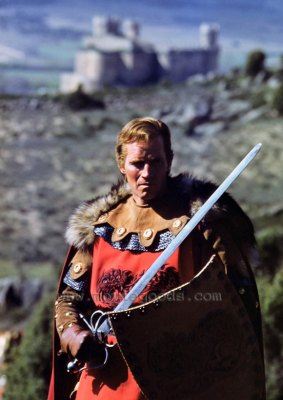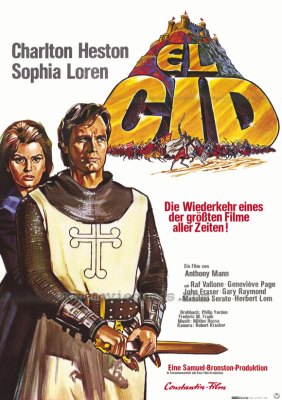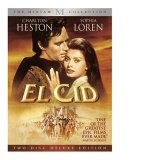| Reviews & Columns |
|
Reviews DVD TV on DVD Blu-ray 4K UHD International DVDs In Theaters Reviews by Studio Video Games Features Collector Series DVDs Easter Egg Database Interviews DVD Talk Radio Feature Articles Columns Anime Talk DVD Savant Horror DVDs The M.O.D. Squad Art House HD Talk Silent DVD
|
DVD Talk Forum |
|
|
| Resources |
|
DVD Price Search Customer Service #'s RCE Info Links |
|
Columns
|
|
|
El Cid - Two-Disc Deluxe Edition
- Moutamin, on Rodrigo Diaz de Vivar, El Cid
One of the best epics to come out of the roadshow era of the 1950s-early '70s, El Cid (1961) is on the short list of big, BIG scale films to show as much intelligence as spectacle, one as intimate is it is grand. Champions of this and other Samuel Bronston-produced epics have been begging for a Region 1 DVD release since the format's inception. The Weinstein Company's release is practically perfect in terms of the packaging and the well-chosen, carefully considered supplements, though the transfer is still as problematic as El Cid's 1993 theatrical reissue.
Back in 2003 I bought the Region 2/Japan DVDs of all the Samuel Bronston epics - 55 Days at Peking (1963), The Fall of the Roman Empire and Circus World (both 1964) were the others. Though I had variously seen the films on tape and laserdisc, it wasn't until I had a chance to experience them in these 16:9 enhanced, 4.0 Dolby Digital Surround mixes that I was really able to appreciate them for what they are. The Weinstein release of El Cid is likewise enhanced with similarly awesome sound, and while the image is an improvement over the older Japanese DVD, the transfer apparently is sourced from an (anamorphic?) 35mm IN (inter-negative) rather than the original Super Technirama camera negative. The resultant image isn't bad, due in part to all the digital clean-up, but it's also disappointingly soft considering how good it should look. Just before settling down to El Cid I finished off a 16:9 Retromedia release, Goliath and the Sins of Babylon, a peplum shot in greatly inferior Techniscope and, truth be told, overall the differences in sharpness was pretty negligible. The absence of ideal elements might also in part account for the lack of a high-definition release up to now.
El Cid follows the efforts of Rodrigo Diaz de Vivar (Charlton Heston) to unite a divided 11th century Spain against the threat of fundamentalist Islamic Moors - and intolerant, petty Christian royals who put their personal pride ahead of Mother Spain. His loyalty is continually tested by rulers unworthy of his loyalty, while his bride-to-be, Chimene (Sophia Loren), cannot forgive him after he's forced to kill her father, the King's Champion.
Critics today generally acknowledge El Cid as one of the best films of its kind while dismissing Bronston's other epics as empty-headed spectacle, but it's really more complicated than that. Looking back on Bronston's oeuvre now, under conditions that at least approximate their original roadshow presentations (this release and those earlier Japanese DVDs do just that) one can see that El Cid is generally magnificent but also flawed, and that Bronston's other epics are (often similarly) flawed but also magnificent. All are far more intelligent than the average Hollywood spectacle of the 1950s; even the John Wayne circus movie, despite some questionable casting (Claudia Cardinale as Wayne's daughter?) offers impressively rich characterizations, particularly Wayne's resentment toward his alcoholic ex-wife, played with unnerving authenticity by Rita Hayworth. 55 Days at Peking, like El Cid grapples with cultural clashes with an intelligence and subtlety sorely lacking in high concept movies today. And like El Cid, The Fall of the Roman Empire transports viewers to a time and place rarely dramatized in movies, and with (for the time) an incredible level of authenticity and detail.
In his excellent introduction penned for the DVD release, Martin Scorsese makes several good points, citing El Cid as a turning point in the industry's move away from homegrown epics produced in and around Hollywood to big international productions shot in Europe with actors and locales from all over the continent, which in turn infused these productions with a different look and approach that markedly separated them from the '50s-style CinemaScope epics produced by Fox and the other majors. (Perhaps only the filmed-in-California The War Lord, also starring Heston, managed to capture that Euro-feel without actually shooting abroad.) When it was new, audiences had never seen a movie about 11th century knights with so much authenticity, with real castles and swordfights where one could feel the full weight of the broadswords. In Hollywood movies such weaponry was brandished about like fencing foils.
Like other Bronston admirers, he also points to the advantages of full scale sets and thousands of extras, and how they carry a weight and texture impossible (or, at least, not yet duplicated) with CGI technology. It's one thing to see 500,000 CGI troops storm a castle, and another to see 1/20th as many real costumed extras clambering over real sets.
Finally, he pinpoints Charlton Heston's contribution to such films, as both a star-collaborator and for the larger-than-life performances I recently discussed here. Scorsese writes, "There's something truly monumental about Heston at his greatest - he doesn't play it, but embodies it." That's exactly it: though classically trained actors on the stage were often called upon to express honor and loyalty, Heston better than anyone else had a remarkable capacity to, with a minimum of dialogue, express such complex emotions on film.
That's really the heart of El Cid, the story of a just man in unjust times, a truly noble man serving a king not worthy of him. Perhaps the film resonates so strongly because it's so heartbreaking to watch, to see Rodrigo's misplaced devotion and the consequences of it, bearing witness to a man mistakenly assuming that his and King Alfonso's aims - a united Spain - are one and the same. Heston later on would come to specialize in playing cynical antiheroes, the very antithesis of El Cid. He excelled at both kinds of parts, but here his performance is truly special. The stupid and selfish decisions of his king utterly confound him yet his devotion to a cause larger than himself remains unabated. (El Cid must certainly resonate with a veritable busload of sitting and former generals serving under the Bush administration.)
El Cid* works best when it explores this paradox, less so with the much more conventional love story with Chimene. What people remember most about the film are outstanding scenes like Rodrigo's rare act of defiance, forcing Alfonso to publicly swear before God that he had no part in the murder of his brother, not Loren's Chimene pining away for her husband in exile in a convent.
She's a conventional epic movie character, unsympathetic and for the most part Loren has no chemistry with Heston. (Compare them with Kirk Douglas and Jean Simmons in Spartacus. Both the actors and their characters are equally star-crossed, yet their affection comes off as infinitely more genuine.) It's not much of a character: virtually all she does in the film is pine for, plot against, and love Rodrigo in exquisitely lit castle corridors. Heston and Loren reportedly didn't get along, and because of her scheduling demands, in a few scenes it's clear the two are acting out footage shot perhaps months apart. One especially awkward moment has the two locked in an embrace but the entire sequence is cut together so that the audience sees only Loren and Heston in different shots, both extreme close-ups to hide the fact that they were nowhere near one another when performing their dialogue.
Except for Heston and Loren, typical of this trend toward international productions that Scorsese alludes to, the cast is composed of excellent British and Continental actors whose lack of stateside marquee value is more than compensated by their verisimilitude. John Fraser's Prince Alfonso is written just a bit too sniveling, but Genevieve Page is superb as his sister, the Princess Urraca, with whom he shares a (very vaguely) implied incestuous relationship. Another standout is Douglas Wilmer's progressive Moor. His scenes with Heston are another highlight; they come to respect one another even as their intolerant leaders, on both sides, recklessly fuel Christian vs. Muslim hatred. Though Herbert Lom's glowering, Conrad Veidt-esque Ben Yussuf was in 1961 terms little more than a convenient Hollywood villain promising death to all infidels (his forces, dressed in black, spill onto the beach of Valencia like a knocked-over bottle of India ink on an unspoiled blotter), its hard to imagine a character like Wilmer's sympathetic one in this post 9/11 world of ours. When an angry mob demands his immediate execution in the opening scenes while Rodrigo insists upon setting him free, he asks them, "Do you want...to live in fear for the rest of your lives?"
For all the platitudes, El Cid has a few clunky moments. When Rodrigo and Chimene steal away a few hours of lovemaking in a barn, Heston finds a hundred admirers patiently waiting to cheer him on just outside. That neither of them would hear the obvious commotion suggests only that Rodrigo isn't quite the crack soldier the film suggests he is. When Chimene is carted off to Alfonso's dungeon, Count Ordonez (Raf Vallone) expresses the same surprise as the audience: "Even all these months in the dungeon haven't marred your beauty!" Indeed, Loren's character ages not a day over the course of the story's 30-year span. The one-of-a-kind ending is quite moving but also slightly comic. Two shots at the very end that conceptually are enormously poetic don't adapt well cinematically, and tend to elicit this contradictory reaction from audiences.
Still the screenplay, credited to Philip Yordan and Fredric M. Frank but apparently completely rewritten by uncredited blacklistee Ben Barzman (with polishing by another blacklist victim, Bernie Gordon) continually impresses with its intelligence and taste. Champions of director Anthony Mann's film noir and later Westerns often argue that his association with Bronston was ruinous to his career, but the film doesn't bear this out. His widescreen compositions (with DP Robert Krasker) are beautifully composed; it's the kind of film where you can almost select a frame at random, blow it up and hang it on your wall. Mann's background in dark noirs and psychological Westerns meshes with this psychological portrait of El Cid surprisingly well.
Video & Audio
If you've skipped down to this part of the review, you'll want to go back to the beginning and read my comments about the transfer there. Beyond that some additional notes: Included is the film's original overture, intermission music (there's no entr'acte) and exit music. The show is presented over two discs, with the film's first 121 minutes (including overture and intermission music**) presented on disc one, with the film's second act on disc two. In a wise bit of DVD authoring, the second disc takes viewers straight into part two; no FBI warnings, ads or other clutter.
The film sourced bears a 1989 copyright renewal noticed supered over the credits, which also appears on the Japanese DVD. The film also notes Britain's Rank as the film's distributor, not U.S. distributor Allied Artists. It's interesting to note that nowhere on the packaging is there mention that the film has been "remastered in high-definition," or that it was mastered from the "original Technirama" negative, which only further supports this reviewer's contention that the camera negative wasn't sourced. Fortunately, the superb Dolby Digital mix lives up to the film's roadshow engagements, faltering only in that some of the dialogue is drowned out by the aggressive music and effects tracks. Generally, though it's outstanding, with swordfights clanging under the full weight of the broadswords, Miklos Rozsa's superb score booming out of the speakers, and some (though not a lot) of the dialogue and sound effects getting a fully directional treatment.
Extra Features
The superb packaging and plentiful supplements make this one handsome and desirable DVD. For starters, this "Limited Collector's Edition" comes with the kind of thing one wishes were included with all roadshow films on DVD: a reproduction of the original 1961 souvenir program. This 38-page, full-color booklet actually looks better (if miniaturized) than old original programs found in used bookstores, and is crammed with great photos and (by 1961 standards) chockfull of behind the scenes information (obviously of a self-promotional nature) and historical data. It's a great supplement. Equally fine is the 38-page, and also full color, reproduction of the Dell Comic Book adaptation from the final screenplay. It's loads of fun. What's labeled as six color production stills are really reproductions of original lobby cards, albeit with the Weinstein logo, etc. below the image. Martin Scorsese's aforementioned introduction accompanies the disc. It's barely two pages long but offers intelligent, concise observations.
The feature includes an audio commentary by Bill Bronston (Samuel's son) and Bronston biographer Neal M. Rosendorf. It's a little less organized and more casual than this reviewer would have preferred, but it's full of interesting and useful information. Disc 1 also includes about 15 minutes of vintage radio interviews with Heston, Loren, and Heston's wife, Lydia. It's the kind of thing common at the time, where these prerecorded promos were cut with local DJs trying to fool their audiences into thinking that they actually sat down with the stars, but it's okay. Also included here is an above average still gallery of behind-the-scenes and promotional material, and short filmographies that aren't of much use but which cover 12 of the principal filmmakers and cast members.
Disc 2 boasts more than two hours of featurettes, all in 16:9 format. These mini-documentaries share the same interview subjects pretty much: Bronston and Mann biographers and their children; archival interviews with Heston and credited screenwriter Phil Yordan; Ben Barzman's widow (who prominently displays both Tender Comrades and Naming Names on a table behind her); along with film clips (including some behind-the-scenes material, and lots of stills. Hollywood Conquers Spain: The Making of El Cid (24 minutes) offers a nice overview of the production though teeters toward the gossipy, particularly at Heston's expense. Samuel Bronston: The Epic Journey of a Dreamer (52 minutes) is reminiscent of the bios of Cubby Broccoli, etc., al. on MGM's 007 DVDs, and full of amusing (if at times uncritical) anecdotes about the uniquely colorful filmmaker. Behind the Camera: Anthony Mann and El Cid (17 minutes) and Miklos Rozsa: Maestro of the Movies (30 minutes) are self-explanatory. Preserving Our Legacy: Gerry Byrne on Film Preservation and Restoration (7 minutes) is something of a misnomer; though it cleverly uses graphics to explain the Super Technirama process, it (and he) are pretty cryptic discussing the particulars of both preservation and restoration efforts concerning the film. Finally, a trailer gallery includes both the 1961 and 1993 release versions, along with one for The Fall of the Roman Empire, but all are old 4:3 letterboxed transfers.
Parting Thoughts
El Cid is one of the great film epics and the Weinstein Company's DVD generally gives the film the special treatment it deserves. Those holding out for a high-def release drawn from the original Technirama camera negative may be in for long wait, based on this transfer's issues, but that's really the only (not insignificant) issue with what otherwise is one of the best DVD releases so far this year. Highly Recommended.
* Throughout the film, Rodrigo is referred to as The Cid, the film's title not withstanding. One imagines long, heated meetings over that fine point.
** Several readers have written in with comments similar to A.L. Hern's: "The intermission music is the entr'acte, and it should've opened Disc 2, rather than bring up the rear on Disc 1, as the El Cid march, like any good intermezzo, is meant to function as a mini-overture to introduce Part II. Weinstein really dropped the ball on this, and so did you for not pointing it out (Fox made the same mistake with their 2-disc DVD of Cleopatra)."
Film historian Stuart Galbraith IV's latest books, Japanese Cinema and The Toho Studios Story, are now available for pre-order.
|
| Popular Reviews |
| Sponsored Links |
|
|
| Sponsored Links |
|
|
| Release List | Reviews | Shop | Newsletter | Forum | DVD Giveaways | Blu-Ray | Advertise |
|
Copyright 2024 DVDTalk.com All Rights Reserved. Legal Info, Privacy Policy, Terms of Use,
Manage Preferences,
Your Privacy Choices | |||||||
















